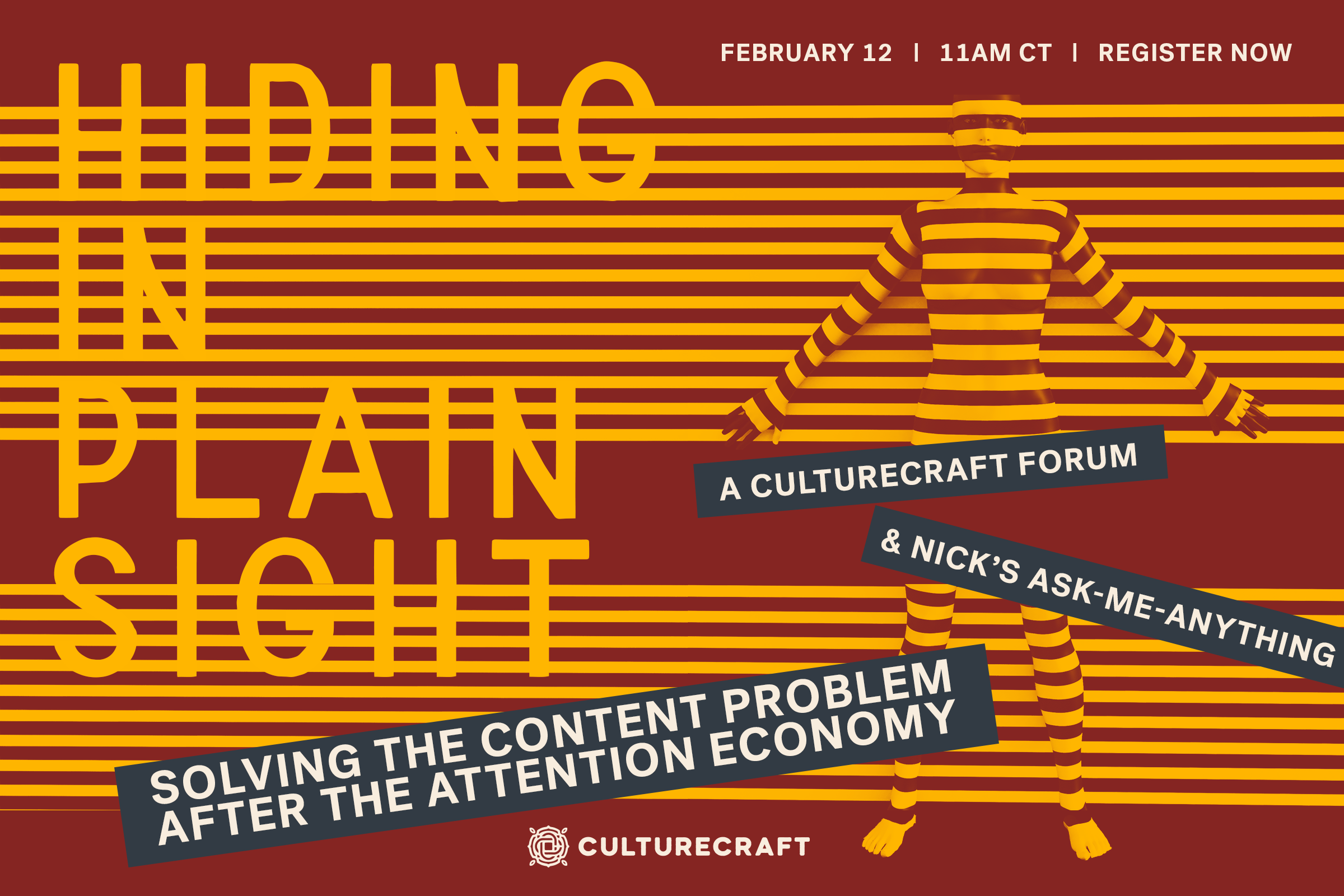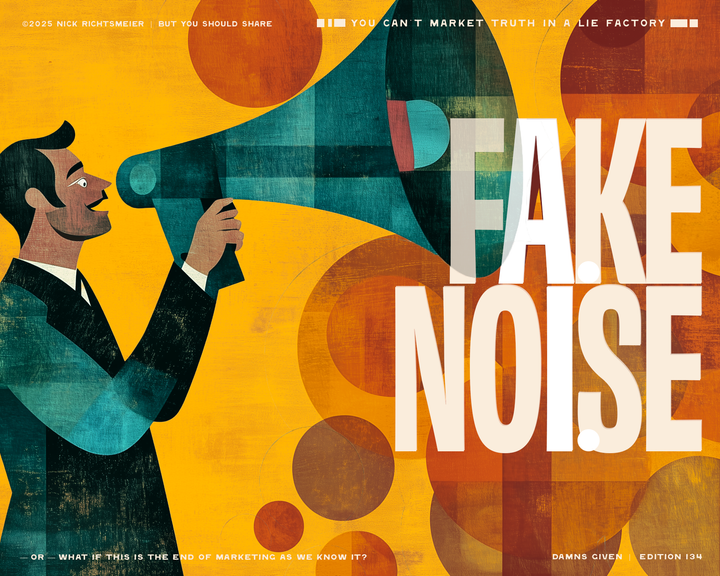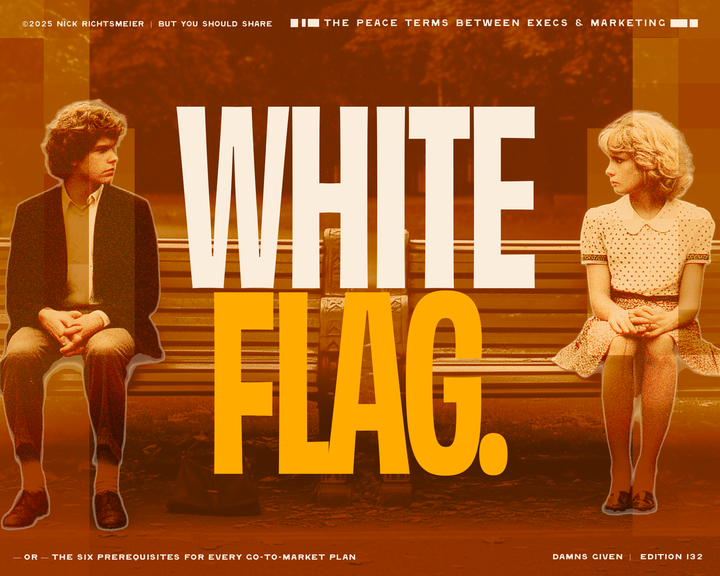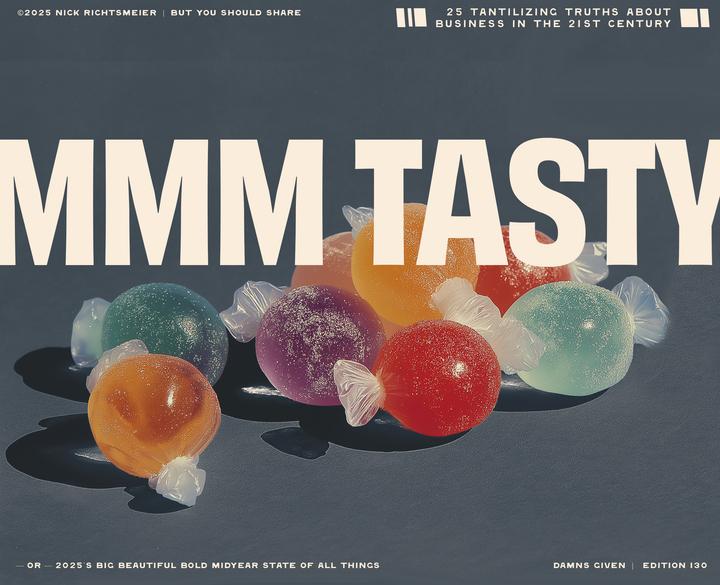Finding your client in a house of mirrors
The Internet is shattered, leaving nearly every adult human dangerously dependent on accessing what to buy, where to buy it, what to think, and who to trust, through portals with no allegiance to truth or value, only to the highest bidder.

FWD 116: Traditional marketing's ability to hide you in plain sight and what to expect from us in 2025.
Hello! Bonjour! In the classic internet parlance... It's been a minute!
If you're like me you're oscillating between it feeling like 2025 has barely just begin, and that January has been 67 weeks long. My Editions publications have gone radio silent to a week-long sickness, travel to spend time with one of our beloved clients, and who knows what else.
I also feel very cognizant that for many reasons that are outside the scope of this publication, our attentions are overrun with a lot of news and noise, and so it has been challenging to reduce down content without spinning out in the maze of our current moment in the economy, in culture, and of course in politics.
But we all must stand under the mantel of our roles in our time. It's jarring to try to say something of value to you under the shadow of crashing planes in Washington DC. And yet, because I spend so much time with you all in our coaching and strategy engagements, I know that you must do what all leaders do: attend to your business, your teams, your clients, and your challenges, even while the headlines stream by.
So that's what we're going to do today. I'm going to offer some brief thoughts on the state of content marketing today, and then as a model of eating my own cooking, talk about where "content from Nick and CultureCraft" are headed in 2025 and some exciting upgrades you can expect as a subscriber.
Forward, forward.
Starving for Attention
This week, we're going to start with a light topic: the raw vulnerability of being unseen, and offer some next steps for firms and institutions that are trying to be seen now that the Attention Economy is KAPUT!
Bye attention, we never knew you.
For those just catching up, the Attention Economy was manufactured by Big Tech to engage millions of American small and medium-sized businesses in the free labor of posting on their platforms and buying ads. You could get clicks! Clicks could get you email addresses! Email addresses somehow magically turn into money!
In the process, they destroyed the business model of the news media, took algorithmic control of Americans' view of reality, and in the very near past, embedded themselves with the political future of the country.
You gotta give it to Zuck, the Google boys, etc. for running the world's first trillion-dollar long con. Part of the magic of it was that it worked just enough. Particularly for most of the 2010s, the incentive system was carefully designed so that if you went all in with the platforms, you could get that coveted first page Google slot, you could mass produce the right content and grab eyeballs, and with the right landing page gates, turn those eyeballs into "leads."
As Americans, we bought this wholesale. Free internet. Free social media. Free email.
Sure maybe you'd swim through an ad or two, but it was no different than TV, right? Who doesn't love a good ad? Ads aren't bad, they're just drawn that way.

Advertising as the logical fee for content access is as old as mass media in America and so we were all of us deceived. (Another ring was made... I'm full of media references today.) The real trade wasn't free platforms for advertisements. The platforms didn't even care that much about our attention. Anyone who's run digital display ads can tell you that the platforms are very good at making it near impossible to see if you're actually getting what you're paying for, even if you think you're paying for attention.
No, we weren't paying with attention, we were paying with data. The Attention Economy was always a branding overlay on the real game: the Surveillance Economy where not only have our activities on the platform been tracked, but our physical locations, our analog interactions with participating businesses, our emails, our Google docs, all of them fed into giant digital decision engines, designed layer by layer by layer to disconnect consumers from the wide world of the internet (where your business and mine live) and take all of that data and house it centrally where it can no longer be accessed reliably by search.
No, now you can only access the great hive mind of the web through AI agents that are taking everything they've learned from and about you and me and transmogrifying into tiny little houses of mirrors custom-designed for each person.
Everyone gets their own reality
These algroithm guarded mirrored villages each have:
- Their own information
- Their own punditry
- Their own approved products and services (approved means paid to boost)
- Their own replacement algorithms whereby third-party creations (like your favorite songs on Spotify) are subbed out for AI-created simulcrums that sound vaguely familiar in your playlist but don't require Spotify to pay any creative's third party.
- Their own fiefdom creative class paid nominal fees (with no transparency as to why) to defend the borders of the house of mirrors and feed people back in with their comedy, their commentary, and their little viral dance moves while holding sponsored products.
The Internet is shattered, and with it any centrally defined sense of reality, leaving nearly every adult human dangerously dependent on accessing what to buy, where to buy it, what to think, and who to trust, through portals with no allegiance to truth or value, only to the highest bidder.
This is the Internet your customers log onto when they come looking for you. This is why you cannot spend the rest of this year playing status quo games expecting to win status quo prizes (e.g. mass producing content and putting it on aforementioned approved platforms). Because you can make all the content in the world, you can design the perfectly worded website, you can even do all the ad strategies they tell you to do and your visibility and engagement will continue to slide off its peak. What engagement you do get, increasingly overrun by bots and people using AI overlays to avoid having to think or type will never buy because in many cases those "people" opening emails, going to your website, and clicking your CTAs, don't even exist.
Hiding in Plain Sight or What to Do Now
Your marketing teams and agencies have all been trained for twenty years to do broad distribution of your message, content, and brand. They've been incentivized (mostly innocently) by the long con, particularly during the 2010s with easy wins and supposedly repeatable marketing playbooks were effusive.
Now that the platforms don't need you anymore, their incentive to let traditional marketing work is gone, and what do we say friends about discerning the business landscape?
Always follow the incentives.
You, you who provide value, build trust, engage in deep relationships, seek to replicate a service or institution that has changed businesses, families, and futures, you have a new incentive: Escape the trap of obsessing about being seen.
Rebuild a new attention economy, not one based on what attention you can extract from dopamine-drugged consumers staring into panes of glass, but one powered by your attention:
- Your attention to nuance. Delivering distinct value where no one else is.
- Your attention to a narrow customer base that is distinctly designed to work with your team and your value.
- Your organizational dynamics and team members, empowering each of them with tools to be ambassadorial in your communities
- Your partners, clients, and constituents who not only are willing to refer you, but would like to you if you would simply make it easy and not awkward for them.
Success in 2025 is not about grabbing attention, it's about giving it to a very narrow subset of things that matter for your venture and your venture alone. The things that are the resistors and catalysts for trust in your work. The ways that you can come out of hiding in plain sight.
To acquire your good clients in a way that is cost-efficient and timely, more is less. To help you isolate how you can make the change from attention-seeking to attention-giving as your core marketing strategy, I'm going back in front of the camera on February 12th. I'll take you through a few best practices and help you understand the necessary framework, followed by the usual AMA.

Eating My Own Cooking
So if you've been here for a while you know that Editions does a bunch of different jobs, and I haven't done the best work divying up those jobs for easy engagement by you all. You guys have responded to three big themes:
- Big long-form marketing/tech/media industry explainers. Last year was big for these, particularly the end of the year. These are heavily researched, cross-referenced, and invite you to address the bigger trends that are happening. More thinking, less "go do this tomorrow."
- Zeitgeist summaries and recommendations. The traditional form of FWD was hitting a few headlines and trends each week, giving some very high level commentary, and my patented form of snark.
- Best practices from the trenches. Truth told? I didn't do a great job of delivering this kind of content last year. It's one of the many reasons for these shifts in tactics.
What to expect in 2025:
First thing is we're dramatically narrowing down distribution. I've cut my Linkedn usage by 80% already, and it will probably go down further. We're going to be heavily focused on two channels: These newsletters and (surprise!) a podcast. Will that shrink our reach? Maybe. Is my time too valuable to wholesale wait for the LinkedIn or Meta to let their algorithm shine its light on me? Honestly, yes.
We're narrowing distribution because we're focused on a very specific audience of people who want to build with trust, who are sick of conventional wisdom (that isn't acutally wisdom) and want to see the way we build relationships and grow businesses recover some first principles. That's probably only about 5% of ventures in most industries. And we're here for that 5%.
As far as content structure, here's what to expect—
Big ideas:
- Monthly EDITION These will be my "This is what the heck is going on" now delivered under the banner MADE. Simply, producing a 2500 word deep dive every week is too much (for you and for us). So we're dialing this back, but building it into our planning so it can be consistent in timing and quality.
- NEW Podcast with my colleague Brad Farris called "Working/Broken" where we address trends and conventional wisdom, answering the question, "Is it working or is it broken?" (I am dangerously unhinged here, so YMMV.) Episodes will drop appoximately 2x month with the first episodes hitting in February. You can find out more at workingbroken.com.
Best Practices and From-the-Trenches Resources
- Digital Forums and Ask-Me-Anythings (Limited Seating): The big feedback we've gotten is you want live engagement with me on more detailed questions. So I'll be creating 8-10 of these forums this year where I'll spend 45 minutes digging in on a tough topic that's affecting our clients and how we're dealing with it followed by another 45 minutes of Q&A. As you know the next one is February 12 on content and the end of the Attention Economy. Register Now.
- Weekly FWD hitting a trend or tool and how to solve a real growth problem spanning from "How to build a C-Suite that powers growth" to "Designing your pricing tiers" to "How to break through the content noise" and everything in between. The goal is to deliver these on Tuesdays. This is a slight shift in the FWD format, making it more dialed into realtime advice and resources, moving the hot topics to the bullet point below.
Zeitgeist and Recommendations
- I am who I am so you can expect to hear media connections and zeitgeist allusions pretty much everywhere in the above. But to focus this I'll be doing a SECOND FWD covering (but much briefer) Headlines, Hubris, and Happy Places every(ish) Friday where I'll be parking stuff I'm noticing, reading, watching, etc.
Lots to look forward to, friends. We'll see you there. Don't forget to register for the next Discussion Forum: Hiding in Plain Sight.



